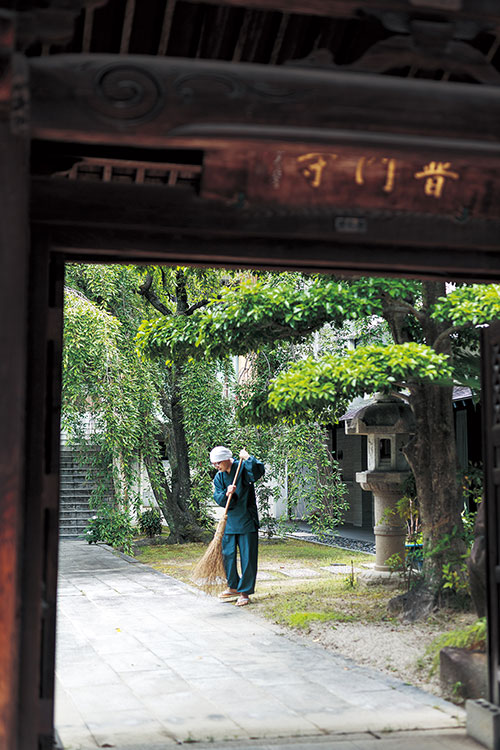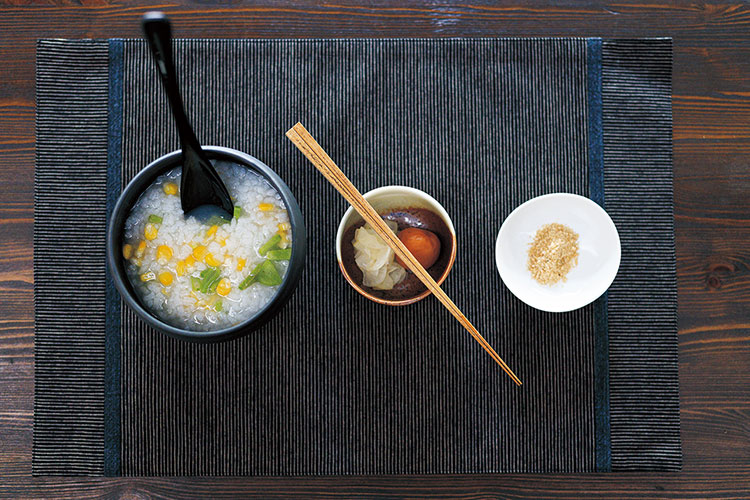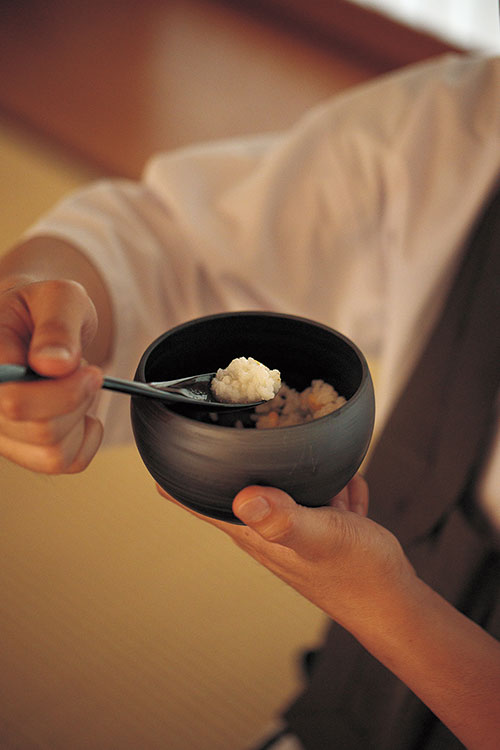
2021 NO.31
MenuTaking a Little Break, Japan-Style

Lessons in Zen:
Regulating Mind and Life
Zen arrived in Japan primarily in the 12th and 13th centuries via India and China. Deeply rooted in modern Japanese culture, this philosophy teaches us that a peaceful mind comes from an ordered life. The wisdom that comes from Zen helps clear the mind and simplify everyday life.
Photos: Kurihara Osamu

Focus on the Present Moment
It is 5 o’clock in the morning. The sun is rising, and the air is clear and crisp. Yoshimura Shoyo, deputy chief priest at Fumonji Temple in Hiroshima, is now ready to do a period of sitting zazen meditation. Breathing slowly and gently lowering his gaze, he sits for around 40 minutes, facing a wall. There is a sense of dignified beauty in his stature as he holds the correct posture in silence.
“What is important in Zen is to focus on the present moment. Sitting zazen gives us a chance to be aware of this,” explains Yoshimura. “Zazen is not for making the mind blank. Miscellaneous thoughts are not to be swept away; there are simply to be accepted. It is a way of looking at oneself objectively, with all the thoughts and feelings that arise, to look at one’s mind and heart.”
“We all as people tend to dwell on the past, worry about the future, and be disturbed by things that are not part of the reality before us. If, through zazen, you can release the tension in your mind and body and face yourself as you are, in the present moment, you will not get caught up in unnecessary concerns.”
Every Action Is Zen Practice
After sitting zazen, Yoshimura reads sutras, eats, and cleans. Every movement is efficient and done with great care.
“The Zen philosophy is that every movement and every action is a form of practice. You must approach each one with serious intent and not take shortcuts.”
Cleaning, an activity often neglected, is actually a practice that lends itself to examining one’s state of mind. Yoshimura also spent a great deal of time cleaning during his two years and two months training as an ascetic at Eiheiji Temple, the head temple of the Soto sect of Buddhism. To keep the large temple and grounds clean, he cleaned constantly, following specific rules.
“You move your body before you can begin thinking. This is precisely what we mean by focusing on the present. Cleaning and zazen have the same effect.”
In the same way, eating a meal is also meaningful. According to Zen teachings, not one grain of rice or the smallest leaf should be wasted. Each ingredient is to be savored, and nothing is left behind. This is why meals are eaten according to very specific rules. There is no speaking, only intentional eating. Complete attention is paid to the meal.
“Zen monks, who do not believe in killing living things, eat mainly vegetables with no meat or fish. This is called shojin ryori (devotional food), because the meal itself is a Buddhist practice. There is meaning in paying complete attention to the meal as a way to experience the present moment fully.”
In zokin-gake cleaning, rags made from used cotton cloths are used to clean the floors and other surfaces. The weight of the body is used to push the cloth with both hands. Using one’s own weight in cleaning makes it easier to focus on the present.
Yoshimura carefully grinds sesame seeds by hand. The kitchen is kept clean and tidy, even while meals are prepared.
His breakfast is similar to the meals he ate when training at Eiheiji Temple. From left: rice porridge, pickles, sesame salt.
Rethinking Daily Life from a Zen Perspective
While it might seem difficult to fit these complete Zen practices into contemporary daily life, it is actually quite possible to incorporate Zen philosophy into each day.
For example, even setting 10 minutes aside each day to clean with care and attention can be enough. During meals, concentrate on the act of eating without being distracted. What is important is to set aside time in your daily activities to be mindful of the present moment, to carefully savor it, and accept it as it is.
“It is a mistake to try to do something to regulate your mind. Rather, cleaning, eating, and even sitting zazen are simply a means of practice. By practicing this principle, you will find yourself naturally settle. The Zen way of thinking says that, by continuously practicing in your daily activities, you can naturally regulate your mind.”
Though these rules may seem rigid, there is in fact a surprising amount of peace of mind that comes from an ordered life. Rethinking your everyday life according to Zen principles may just be the way to go.
Yoshimura Shoyo
Born 1977. Deputy chief priest at the Soto sect Fumonji Temple, Hachiyasan (in Hiroshima). Yoshimura is also a clinical psychologist and works at a hospital in Hiroshima Prefecture, in addition to lecturing and writing. He is the author of such books as Kokoro to kurashi ga totonou zen no oshie (“Zen Teachings for Regulating Mind and Life”) and Shojin ryori ko (“Principles of Shojin Ryori”).








